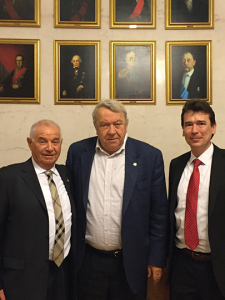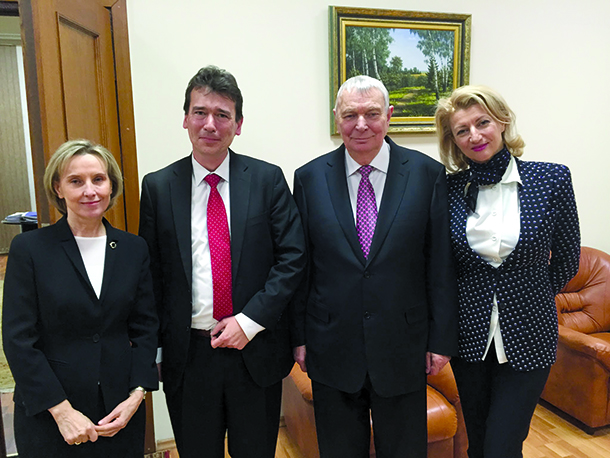Keck School of Medicine of USC researchers traveled to Russia recently to participate in Moscow Science Week as part of an effort to increase participation in ENIGMA, an international, collaborative study of the brain.
Paul Thompson, PhD, Keck School of Medicine of USC professor and principal investigator and co-founder of the Enhancing Neuro Imaging Genetics Through Meta Analysis (ENIGMA) network, joined Vladimir Zelman, MD, PhD, ENIGMA Coordinator in Russia and professor and co-chair of the Department of Anesthesiology, for a week of ENIGMA-related events in Russia.

From left, Vladimir Zelman, Vladimir Fortov, President of the Russian Academy of Sciences, and Paul Thompson, seen in Russia in December 2015. (Photo courtesy of Paul Thompson)
“We see a great surge of interest in ENIGMA, which is widely known across Russia,” Zelman told Rossiya 24, a national news channel of the Russian Federation.
In a series of interviews on Russian national television, Zelman noted the vibrant partnerships in ENIGMA across Russia that now are producing groundbreaking discoveries about the human brain. The Russian Deputy Minister for Education and Science, Lyudmila Ogorodova, attended ENIGMA’s meetings and noted her strong support for ENIGMA and its established and extensive partnerships with other Russian science initiatives, such as Co-Brain, and NeuroNET.
In two days of highly animated sessions of the Russian National Academy of Sciences, of which Zelman is a member, a series of workshops and symposia hailed ENIGMA’s work bringing scientists together as part of Moscow Science Week. Thompson thanked senior members of the Russian Academy, including its president, noted physicist Vladimir Fortov, PhD, for supporting ENIGMA and promoting its ongoing projects to their colleagues. Karkhevich Institute Director of Information Techology, academician Alexander Kuleshov, said that he is sending three mathematicians to the ENIGMA Center in Los Angeles to boost the ongoing machine-learning efforts to discover genomic markers of brain disease.
Interviewed by V Mire Nauki, a Russian-language publication of Scientific American, Thompson pointed to developments being accelerated by ENIGMA’s Russian scientists in the fields of genomics, machine-learning, and analysis of brain connectivity, such as finding patterns in medical data to detect and classify autism spectrum disorder and Alzheimer’s disease.
The ENIGMA Network brings together researchers in imaging genomics to understand brain structure, function and disease based on brain imaging and genetic data. ENIGMA’s 500 scientists now study 12 brain diseases in more than 35 countries, and have published the largest-ever genomic analyses of the brain.
Russian scientists have long been a key source of expertise for ENIGMA, since noted Moscow geneticist Kazima Bulayeva published a series of reports in 2012 from her cohorts in the highlands of Dagestan. Her work reveals how genes implicated by ENIGMA affect brain structure and people’s risk for intellectual disability and psychosis. Understanding the transmission of these genetic sources of risk underlies partnerships between her team’s work in population genetics and ENIGMA’s work on the genetics of the human brain.


